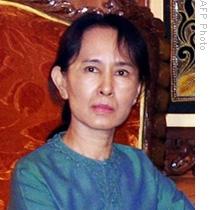Bangkok
02 November 2009
Two senior United States diplomats are heading to Burma this week to meet with the military government and detained democracy leader Aung San Suu Kyi. The visit is the highest level dialogue between the United States and Burma in more than a decade and has been welcomed as a positive change in Washington's Burma policy. But whether or not Burma will respond constructively remains to be seen.
The U.S. Assistant Secretary of State, Kurt Campbell, and his deputy, Scot Marciel, arrive in Burma Tuesday for two days of high-level meetings.
 |
| Burma's opposition leader Aung San Suu Kyi (2008 file photo) |
The visit has been welcomed as a positive change in Washington's Burma policy, from one of isolation to engagement.
The Secretary General of the Association of Southeast Asian Nations, Surin Pitsuwan, recently told VOA that Washington's willingness to talk with Burma, also known as Myanmar, is opening a "new ballgame" for the region. He says countries in Southeast Asia are looking forward to seeing adjustments from both sides.
"This is a new opportunity. And, all of us in ASEAN, every member state, recognizes this new opportunity," he said. "And, I think Myanmar itself recognizes that this is a golden opportunity for engagement, for interaction, for dialogue, which is well and good. And, I think it's going to be good for the region."
The ten members of ASEAN are Brunei, Burma, Cambodia, Indonesia, Laos, Malaysia, the Philippines, Singapore, Thailand, and Vietnam.
ASEAN has upheld a policy of engagement with member Burma, while occasionally criticizing the military government's rights abuses.
Earlier this year, President Barack Obama's administration said neither that engagement nor U.S. sanctions had brought about democratic change and that Washington would move to pursue high-level meetings.
Aung San Suu Kyi has welcomed the change in policy and the visit this week by U.S. officials.
Nyan Win is the spokesman for Aung San Suu Kyi's political party, the National League for Democracy. He says they hope the high level U.S.-Burma meetings will bring about an unconditional dialogue between the NLD and the military government.
"She's ready to compromise all the things on economic or political. She hopes, she wants to meet the junta to compromise about the situation," he said.
The U.S.-Burma meetings this week follow signs of a possible thaw in relations between the military government and Aung San Suu Kyi.
Aung San Suu Kyi recently said she is prepared to work with Burma's military government to see economic sanctions against the country lifted.
At the ASEAN summit in October, Burma's prime minister indicated they could lift some restrictions against the detained Nobel prize winner and allow her to play a role in the country's political reconciliation if she behaves.
Although they have not spelled out what they want from Aung San Suu Kyi, Burma's military government has been seeking endorsements of elections planned for next year.
Critics say the military has already rigged the constitution to keep themselves in power and rights groups say they have been imprisoning dissidents and opposition supporters.
David Steinberg, a professor of Asian studies at Georgetown University, says he is not very optimistic that Burma's military government will respond positively to the new U.S. policy or release the country's more than two thousand political prisoners. But, he says U.S. engagement is still needed to get out of the current stalemate.
The military are going to be around in terribly influential positions in that society for the foreseeable future," said Steinberg. "And, it is very important that the United States deal with the military, know who they are, know the individuals, and then be able to appraise how we might affect change."
The United States, the European Union, and others imposed damaging sanctions on Burma for suppressing democracy and human rights.
Washington says, while it will hold dialogue with Burma, the sanctions will remain in place until there are signs of real democratic change in the country.
The United States wants Burma to release political prisoners, including Aung San Suu Kyi, and allow next year's elections to be free and fair.
But few analysts expect Burma's military government would allow Aung San Suu Kyi to participate in the elections.
The NLD won Burma's last elections in 1990 but the military government ignored the results. They have kept her locked up for most of the time since.
The last senior American politician to visit Burma was U.S. Senator Jim Webb. He met with Burma's military leader Than Shwe in August when he secured the release from prison of American John Yettaw.
Yettaw was facing seven years of hard labor for an uninvited visit to Aung San Suu Kyi's house where she has been detained for most of the last two decades despite international pressure for her release.
Webb was also permitted to visit Aung San Suu Kyi. But, while Yettaw was released, the democracy leader's house arrest was extended by 18 months.